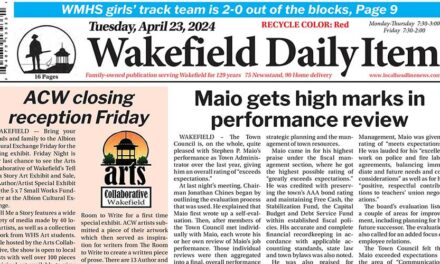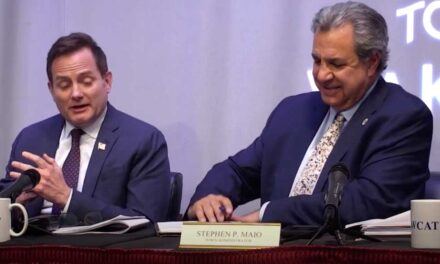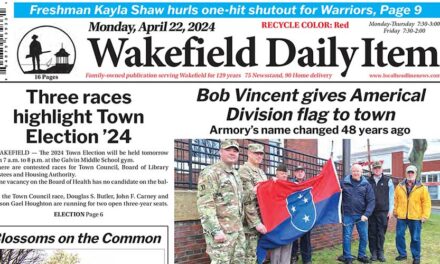Published in the November 9, 2020 edition.
By MARK SARDELLA
WAKEFIELD — Saturday’s Town Meeting approved two measures that will further restrict the types of plastic bags that stores and restaurants can offer their customers and limit the use of polystyrene packaging and the availability of plastic straws and utensils in Wakefield.
Supporters of Articles 8 and 9 (including the Environmental Sustainability Committee, which sponsored them) insisted that passing these articles was essential for the welfare of the planet, while opponents argued that now was not the time to be imposing burdensome restrictions on local businesses already struggling with COVID-19-related economic hardship.
Melissa Eusden of 3 Fairmount Ave. presented Article 8 on behalf of the Environmental Sustainability Committee.
Eusden asserted that polystyrene is based on styrene, a neurotoxin and “probable carcinogen.” She said that “polystyrene easily breaks down into small pieces that end up in lakes and waterways, harming wildlife.” She said that polystyrene is made from fossil fuels and is seldom recycled due to its low value.
Under Article 8, Wakefield food establishments would be prohibited from dispensing food or beverages to any person in disposable food containers made from foam or rigid polystyrene, Eusden said, and Wakefield retail establishments would be prohibited from selling or distributing disposable food containers and packing material made from foam or rigid polystyrene to customers.
Sponsors of Article 8 claimed that the cost to switch from polystyrene containers to alternatives would amount to an increase of “less than eight cents per item” and suggested that businesses may be able to overcome cost barriers through organized bulk purchasing.
Violators would be given a warning for a first offense, followed by an escalating schedule of fines of up to $300 a day. The proposed bylaw would be enforced by the Town Administrator, who would also have the power to grant waivers in cases of hardship.
Town Councilor Edward Dombroski said that he agreed with the objectives of Article 8 but argued that “education and incentives” were the way to accomplish them. He pointed to the number of local businesses “teetering on the edge” and insisted that Article 8 was “unnecessary and punitive at a time when our businesses just can’t take it.”
Environmental Sustainability Committee member Suzy Veilleux said that the committee did reach out to businesses and found that there was “an expectation that this was coming” on the part of merchants.
Daniela Nedbalek of Lowell Street encouraged approval of Article 8 saying, “We are losing the battle with climate change.” She pointed to hardship waivers available to businesses.
Charles McCauley of Lawrence Street argued against Article 8, asserting that it would not reduce the amount of trash that Wakefield incinerates. He made a motion for indefinite postponement of Article 8. His motion for indefinite postponement failed and discussion on Article 8 continued.
Robert McLaughlin of Water Street said that it would be bad timing to impose these restrictions on distressed businesses. He also said that he had a problem with the fine system.
Robert Vincent of Flanders Lane supported Article 8, pointing out that businesses would have time to adjust as the provisions would not go into effect until June of 2021 and there was an additional six-month waiver for hardship.
Ami Wall of Elm Street said that the measure would be a burden on local small businesses, which support the community.
Julie Scott of Main Street agreed with Dombroski that education and incentives were the more effective way to go. She said that customers should ask businesses to make changes.
Bronwyn Dell-Volpe of Cyrus Street argued that the time was past for education. “We don’t have time to delay,” she said. “Now is the time to get this done.”
Town Councilor Paul DiNocco of Wiley Street questioned the amount of outreach that was done to businesses. He said that he emailed about 250 local businesses and not one that responded to him had been contacted and none voiced support for Article 8.
Carol Zoubek of Main Street, a member of Sustainable Wakefield, suggested a link between cancer and drinking coffee from Styrofoam cups.
Town Councilor Julie Smith Galvin insisted that “Climate change is too advanced for us not to act now.”
Dennis Cloherty of Harvest Road claimed that due to the amount of plastic in the environment, everyone eats the equivalent of one credit card per week.
When put to a vote, Article 8 passed by a wide margin.
Myra Sessions of Richardson Street, a member of the Environmental Sustainability Committee, presented Article 9.
She said that Article 9 would expand the ban on plastic checkout bags to restaurants (currently just retail stores are covered) and the ban would now apply to all plastic checkout bags regardless of thickness. Article 9 would further limit the distribution of plastic cutlery, stirrers and drinking straws to be available by customer request only.
Sessions asserted that plastic continues to pollute the environment, including lakes and waterways, clog storm drains and harm animal life. Plastic bags/straws are infrequently recycled, are often disposed of improperly, degrade slowly in landfills and release toxins when incinerated, she added.
Expanding the plastic bag ban to food establishments would further reduce the source of plastic bags, Sessions insisted, and limiting plastic cutlery, stirrers and straws to “upon request” only will further reduce plastic use and environmental damage while accommodating those who need/want them.
Enforcement of the provisions of Article 9 would also fall to the Town Administrator, with punitive measures ranging from a warning up to $300 per day for repeat offenders.
Those who spoke against Article 9 voiced many of the same arguments that were offered against Article 8, warning that now was not the time to be adding burdensome restrictions on struggling businesses.
“We can’t keep doing this to businesses,” said Ami Wall of Elm Street.
In the end, Article 9 also passed by a wide margin




